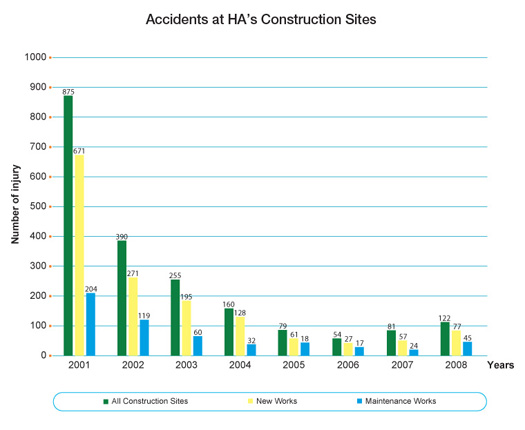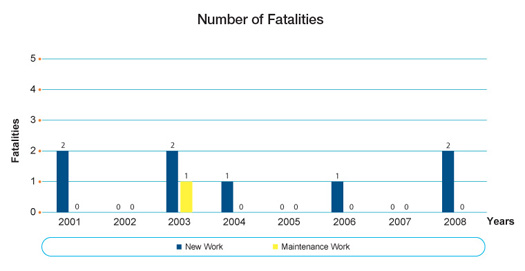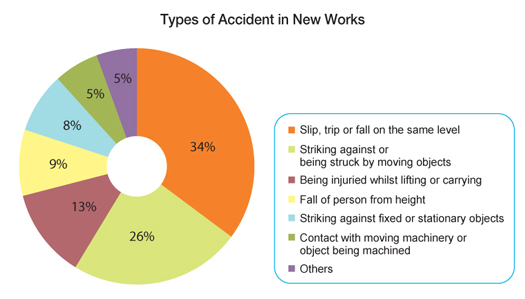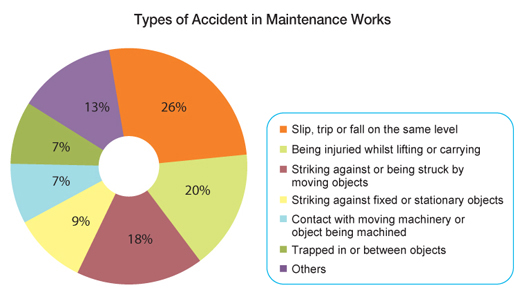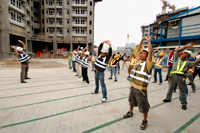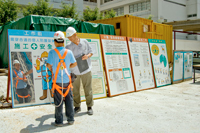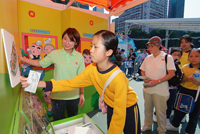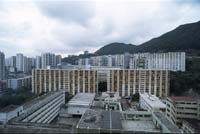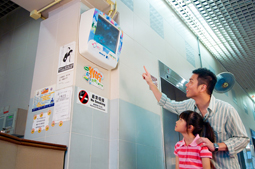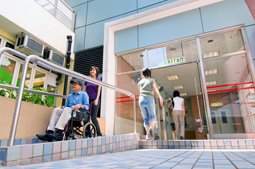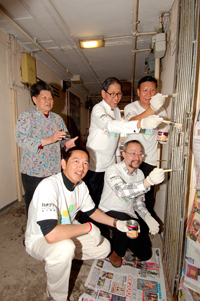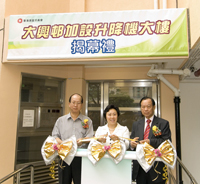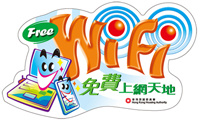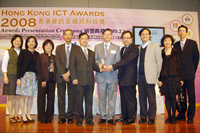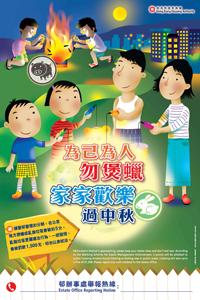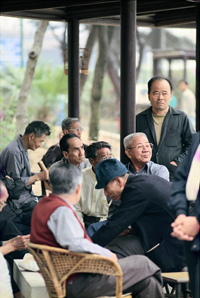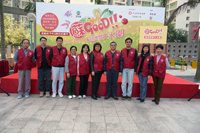Our Social Performance
We endeavour to provide our services responsibly, efficiently and cost-effectively to ensure well-being of our employees, business partners and residents. Transparency and communication are major factors in maintaining good relations with our stakeholders for attaining medium and long-term objectives and promoting sustainable growth.
To foster a safety culture and good corporate citizenship, we have focused on a wide range of social initiatives such as introducing safety measures at construction sites and protecting workers' wages.
The Hong Kong Council of Social Service awarded our executive arm Housing Department the "Caring Organization Logo". This has been the third consecutive year in recognizing our contributions to the local community.
During the year, we fully complied with all applicable social legislation.
Improving Safety
As one of the largest housing developers in Hong Kong, site safety is our major concern. Efforts are always being made to maintain and raise high safety standards in workplace. During the year, two fatal accidents were experienced along with a slight increase in the accident rates of the construction sites. In order to mitigate this, vigilant investigation of the situation and work processes were initiated. Problems identified include improper lifting method that may cause injury. Actions were then immediately taken to alert the contractors to this issue.
In order to tighten performance monitoring and further enhance hazard control through independent audits, we have conducted a system review and enhanced the Housing Authority Safety Auditing System (HASAS) for implementation from January 2009 and onwards. Major enhancements included:
- Mandate checking of tower crane lifting operation on working floor and ground floor;
- Instigate generic checklist for high risk activities for which safety control measures or step-by-step safe operation procedures have to be submitted along with site demonstrations for safety audits;
- Introduce "Critical Pass" elements Safety Audit Checklist;
- Forge the implementation of Safe Working Cycle, Safety Climate Index Survey and foster Work Safe Behaviour practice, and encourage safety innovation; and
- Strengthen link to Pay for Safety Scheme on account of performance driven criteria, based on safety audit results.
| Safety Targets for 2008/09 | Progress |
|---|---|
| Continue to tighten monitoring of contractors with high accident rates. | Fully Met |
| Enhance the 'Pay for Safety, Environment and Hygiene' scheme with more performance driven initiatives for site safety. | Fully Met |
| Tighten control measures for high-risk operations on site. | Fully Met |
| Continue to hold regular seminars on best safety practices with the participation of contractors and project teams. | Fully Met |
| Continue to partner with industry stakeholders in territory-wide safety campaigns and publicity. | Fully Met |
| Improve safety of office operations with potential health and safety risks. | Fully Met |
| Continue to provide safety training to staff. | Fully Met |
| Issuance of site safety handbook and guidelines. | Fully Met |
In 2008, there was slight increase in accident rate at our sites, which rose from 11.9 injuries per 1 000 workers (from 2007) to 16.1. Despite this slight increase, our accident rate overall has declined steadily over the years from 55.8 cases per 1 000 workers in 2001 and is well below industry accident statistics. The figure for the overall construction industry decreased from 114.6 to 61.4 in the same period.
The distribution of the six common types of accident in both new works and maintenance works sites are presented below. The most frequently occurred accidents for both sites is "Slip, trip or fall on the same level".
To reinforce our safety commitment - to lower the accident rate and achieve zero fatalities - we have continued the following effective initiatives:
- Regular monitoring and review on the performance of our contractors;
- Implementing site safety assessments through HASAS, Performance Assessment Scoring System (PASS), Maintenance Assessment Scoring System (MASS) and Property Services Agent Scoring System (Quarterly Estate Scores);
- Previous records of serious or fatal accidents are taken into consideration for tender invitation when granting works contracts;
- Contractual controls which maintain high standards of site safety requirement;
- The "Pay for Safety Incentive Scheme" programme, which provides incentive payments to contractors for their positive safety practices; and
- Regular meeting with government departments, contractors' associations and workers' unions under the Housing Department Site Safety Sub-committee to raise the contractors' awareness of safety and facilitate subsequent reviews of their safety performance.
Performance Assessment Scoring System
Performance Assessment Scoring System (PASS) was utilised to assess, monitor and measure the performance of our building, building services and piling contractors. The effectiveness was proven throughout the years. The improvement of the average PASS score (comparing against 2002 and 2008) for different contractors are:
| Type of Contractors | Average PASS Score Improved (Compared with figures at the end of 2002) |
|---|---|
| Building Works | 0.56% |
| Electrical | 17.3% |
| Fire Services and Water Pumps | 18.6% |
| Lifts and Escalators | 7.1% |
Due to the effectiveness and benefits of this system, the use of PASS was extended to our demolition and soft landscape contractors on a trial basis which have been completed and a review is being carried out before implementation.
"Safety Coordinator, Safety Officer" Programme
To foster the site safety environment of Property Service Agents (PSAs), maintenance contractors and cleansing contractors in Public Rental Housing (PRH) estates, we have introduced the programme of "Safety Coordinator, Safety Officer" for Building Works contractors and PSA respectively. These personnel are required to be employed by the service providers and they have to formulate safety policy for the company in order to ensure that they will meet the safety requirements throughout their contract period.
Fall Arrest Horizontal Life-line System
A comprehensive technical specification on Fall Arrest Horizontal Life-line System (FAS) has been incorporated in the contractual agreement to further enhance the safety of staff carrying out maintenance and cleansing duties at a height. As of 31 March 2009, FAS had been installed at 162 domestic blocks with slanting canopies in 31 estates to ensure safety of working at a height.
Reinforcing Fire Safety
Gaining strong resident support, Estate Management Advisory Committees (EMACs) actively organise fire safety awareness promotional activities among our estates. A record high of over 90 fire drills and promotional activities were organised in 84 estates during the year. Two territory-wide award winning fire safety quizzes were also organised, requiring participants to browse through our fire safety mini website to complete the quizzes. We also worked closely with the Fire Services Department, whose mobile publicity unit has been displayed in 29 estates over a period of four months.
Lift and Escalator Safety
In 2008/09, an increasing number of escalator accidents were reported. In view of this, a lift and safety campaign was launched in July 2008 to introduce related safety messages to our residents. Tips and advice on how to avoid accidents when using lifts and escalators are given to our residents by hanging sign-boards with safety messages near the escalators, as well as promoting the safety message in EMACs' Newsletters and our audio visual Housing Channel. Such arrangement leads to a dropping of the number of lift and escalator accidents by 20% when comparing to the same period in 2007/08.
Safer Homes in Safer Surroundings
To foster safety and health in PRH estates, we have piloted six of our estates to join the "Safe and Healthy Estate Accreditation Scheme" organised by the Occupational Safety and Health Council. These six estates will be designated as "Safe and Healthy Estates" once endorsed by the authority.
Protecting Workers
Working beyond legal compliance, we make our best efforts to protect the rights of workers in our building contracts as well as our service contracts. We continue to implement the provision of Labour Relation Officers to protect workers to foster timely payment of wage, as well as worker's rights and benefits. Tighter measures have been enforced under the Demerit Point System to protect non-skilled workers from exploitation. Default Notices will be issued to the defaulting contractor for breaching the contractual obligations with regard to wages, working hours and workers' rights and benefits as stipulated in the employment contract. These Default Notices, carrying demerit points, will affect the contractor's future tender opportunities.
To monitor compliance status of our contractors, the Central Monitoring Unit conducts investigations into suspected cases of non-skilled worker exploitation. During the year, about 150 000 employment records and attendance records of non-skilled workers covering 47 cleansing and security service contracts in 34 estates were checked and 1 324 non-skilled workers were interviewed with regard to employment-related irregularities. Helping both contractors and workers to be aware of their rights and responsibilities, we disseminate information on workers' rights through information leaflets, interviews, seminars and briefings.
Sustainable Living Environment
Greater Transfer Scheme
In 2008/09, a number of transfer schemes were launched to provide greater transfer opportunities for existing residents. We adopted two territory-wide Overcrowding Relief exercises under this initiative. These exercises provided housing alternatives for the overcrowded families by relocating them into larger homes. During the year, these schemes had successfully re-housed 1 030 families and reduced the total number of overcrowded households from 4 340 to 3 730.
Similarly, households living with an internal floor area of below seven m2 per person can apply through our Living Space Improvement Transfer Scheme for transferring to a more spacious accommodation. During the year, 1 630 households were successfully re-housed under the practice of this scheme.
During the year, three regional transfer programmes were also implemented, enabling existing tenants to move to new flats within the same locality. 1 620 families have been moved under this initiative while a further 4 600 households were re-housed under internal or special transfers for health or social reasons.
Redevelopment and Clearance
To enhance the quality of living for residents in our older estates, assurance was made to meet the modern living standards through the launch of redevelopment and clearance activities. In 1988, a Comprehensive Redevelopment Programme (CRP) was implemented to redevelop a total of 566 old housing blocks. A total of 559 blocks have been redeveloped till today, and the programme will come to an end with the clearance of the remaining seven blocks at Lower Ngau Tau Kok Estate which consists of 5 405 residential units.
With the successful implementation of the CRP, older estates are now evaluated under the Comprehensive Structural Investigation Programme which was launched since 2005. Buildings which are over or with 40 years of history would be evaluated by this programme based on their structural safety, economic sustainability and quality of accommodation. Based on the results, a decision would be made on whether the building would be demolished or maintained for a further period of at least 15 years. As a result of the programme, the clearance of So Uk Estate will take place in two phases: Phase 1 is scheduled to be completed in 2009, whilst Phase 2 in 2012. Due to the clearance, 3 600 families have been rehoused so far.
In July 2008, another decision was made to clear Block 12 of Kwai Shing East Interim Housing which consists of some 820 flats housing around 600 people. This Interim Housing is due for clearance in early 2010. Arrangements for the clearance of Block 22 in Tung Tau (1) Estate, consisting of some 900 flats housing around 1 400 people, were approved in March 2009 with its clearance scheduled for completion in 2012.
We also offer rehousing arrangements for clearees affected by clearances of squatters and illegal rooftop structures undertaken by the Lands Department and the Buildings Department respectively. During the year, a total of 420 rehousing applications were processed with 120 applications from squatter/emergency clearances and 300 applications from clearance of illegal rooftop structures in private tenement buildings.
Universal Accessibility DesignsWith our Universal Design principles adopted since 2002, we aim at creating a safe, convenient and barrier free living environment for our residents. We ensure our PRH Estates will provide "socio-spatial equity" for everyone. We are building our estates to meet the diverse needs and capabilities of all residents, enabling "ageing in the community" and creating a safe and accessible environment for the elderly and physically impaired, so that they can stay in the community when they age. Facilities such as lifts and escalators in hilly areas, access ramps and barrier free access, tactile paths for the visually impaired, audio-visual information as well as safety features at home are all contributed to an inclusive and more sustainable living environment. |
Caring for the Elderly
Around 2 000 volunteers, including our Chairman Ms Eva Cheng, participated in the Seniors Day that was held on 15 February 2009. They visited more than 800 senior tenants in 50 PRH Estates to show their care and distribute gifts to the elderly.
Estate Improvement Programme
In line with our commitment to constantly improve the conditions of our estates, specifications for maintenance of our buildings were reviewed with addition of 22 new, revised or enhanced items during the year. One of the most notable new items is the use of epoxy-coated cast iron drainage products, specifically selected because of its durability that can minimise subsequent maintenance, disturbance and disruption.
Water Supply Systems
We have continued our water supply system improvement programme with 20 pump rooms in 10 estates renovated in 2008/09, making a total number of 325 pump rooms being renovated under this programme. Additionally, 70 cast iron pumps were replaced with more durable stainless steel pumps while 19 high-speed pumps were replaced with more modern low-speed and low-noise pumps.
Better Pedestrian Access
Pedestrian accesses in PRH estates are improving under the implementation of our new lift modernisation programmes. In respond to the Chief Executive's call to improve the pedestrian environment, we are enhancing the pedestrian access in external areas such as hillsides as well as in low-rise housing blocks. A four-year programme has been drawn up with lifts and escalators being installed at some 60 locations in 32 estates. Consultations and feasibility studies are currently being carried out.
In 2008/09, two new lifts were installed in Tai Hing Estate which was originally not provided with lifts. Similarly, another two in Yue Wan Estate are still under construction. At the same time, 399 lifts in 25 estates have been replaced since our lift modernisation programme was launched; and corresponding work for a further 183 lifts in 13 estates are either under installation or at the final stages of completion.
Electrical Re-wiring
In 2008/09, around 17 000 residential units in 17 estates were rewired and fitted with upgraded socket outlets under the Rewiring inside Domestic Flats Programme.
External Drainage Inspection
As part of our maintenance work, we conduct door-to-door inspection of internal and external drainage pipes on regular basis. After the 12th round of inspection ended in March 2009, 1 053 blocks were checked, with defective pipes found and repaired in 299 blocks.
Digital Terrestrial Television
After the second phase upgrade of the communal aerial broadcast distribution system, all of our tenants are now able to enjoy digital terrestrial television broadcast upon the use of corresponding set-top boxes.
Free Wi-Fi Services
In addition to the free Wi-Fi services provided at 120 PRH estates in early 2008, a second service provider has provided similar services at 45 estates for free in which 26 of them were previously uncovered. This means that the free Wi-Fi services, which can be accessed at ground floor lift lobbies, external and outdoor recreational areas, are now available at all PRH estates.
Digital CCTV Surveillance Systems
The Closed Circuit Television (CCTV) systems at 192 blocks in 37 estates were completely upgraded during the year. Each set of CCTV was upgraded with digital recording equipment and colour LCD monitors. Broadband and local area networks were introduced to the system, helping to improve the quality of security video footage to a greater extent.
Estate Management
| Estate Management Targets for 2008/09 | Progress |
|---|---|
| Continue implementation of the Marking Scheme in all PRH estates and factories to enhance the living and factory environment respectively. | Fully Met |
Marking Scheme for Estate Management Enforcement
In order to encourage the residents to be considerate to their neighbours and the community, the Marking Scheme for Estate Management Enforcement was introduced in 2003. Under this scheme, tenants receive penalty points for various "misdeeds" that cause a hazard to health, their neighbours or the environment. If a household has accrued 16 or more valid penalty points in two years, they are served with a Notice-to-Quit for their rental units.
Mobile Application System for Housing Management
Mobile Application System for Housing Management (MASHM) is an innovative and secure mobile system developed by the HA to enhance its housing management. It helps to improve the mobility and productivity of frontline housing staff, as well as boosting information sharing and operation efficiency. The system enables housing staff to conduct outreach estate management duties to utilise state-of-the-art technologies such as mobile handheld devices and the mobile data communication network. MASHM not only allows our staff to download in advance or on the spot all required information but also to instantly upload files such as data or maintenance orders collected from residents. Others in the backend office can then share the information and take follow-up actions.
MASHM was well-recognised. We have recently received a bronze award under the "Best Public Service Application (Transformation)' category of the "Hong Kong ICT Awards 2008" for this innovative technology.
Enriching Daily Life
In addition to our housing activities, we make every attempt to create pleasant and enjoyable surroundings for our residents. Through the provision of retail, commercial and welfare facilities, we seek to improve the residents' quality of life and provide a focal gathering point for the local community.
In the past year, new shopping centres in Tin Ching, Choi Ying, Ching Ho and Upper Ngau Tau Kok Estates were completed, adding a further 6 000 m2 of retail spaces to our portfolio. With the divestment of a major share of our retail and car parking facilities to The Link REIT in 2005, our total stock currently stands at some 159 240 m2 of commercial and retail spaces, 27 000 car parking spaces, as well as various factories, welfare and miscellaneous premises.
While the occupancy rate of our car parks has slightly increased, charges remained at 2008 levels in view of the uncertain economic climate. At the same time, providing incentives for regular car park users, we continue offering parking coupons at 20% discount for bulk purchases of 50 coupons or multiples thereof.
Better Business Environment
In October 2006, we introduced the Enhanced Marking Scheme (EMS) for improving the cleanliness as well as the business environment of our shopping centres via the allocation of demerit points for various misdeeds. The EMS has proven to be highly successful as a deterrent. So far, 198 warnings have been issued based on 150 cases when points were allocated. Over 90% of these points were related to obstructions in public areas. In parallel with this penalty system, an Incentive Award Scheme was launched with the same objectives. Under this scheme, incentives and awards are presented on a quarterly basis with a number of categories, including Best Toilet Management and Best Hygiene for Food Premises, in order to encourage the maintenance of cleaner and more pleasant surroundings. Public Housing Surveys showed that customer satisfaction levels are significantly raised through both greater community participation and the improved surroundings.
Ensuring Quality Service
To warrant the quality of the new and existing HA developments and alteration works, we have an Independent Checking Unit (ICU) to provide third party monitoring and control of our buildings and facilities, including those commercial uses which are now owned and managed by The Link REIT.
We also collaborate with our service contractors to deliver high quality estate services. In order to promote mutual understanding with our PSAs, members of EMACs, local political parties as well as our frontline staff, the HA regularly hold meetings and partnership workshops to forge trust, co-operation, commitment and partnership.
To further increase service standards and build a professional workforce, we help to provide training opportunity to the PSA staff, around 200 PSA frontline staff were sponsored to attend and complete the course "Certificate in Public Housing Agency Management Course" organised by the Hong Kong Polytechnic University.
Apart from this course, refresher courses focusing on the maintenance of building services installation were held in February and September 2009 to share with the PSA technical staff on maintenance activities in which site safety and quality assurance were the major topics.
Enhancing Public Health and Hygiene
Promoting Responsible Behaviour
The Marking Scheme for Estate Management Enforcement was proven to be highly effective. A warning system is in place for 12 out of the 28 misdeeds under the Marking Scheme. Penalty points are only allotted if the offender ignores one written warning and repeats the same misdeed despite the warning.
In response to the large number of complaints with regard to dripping condensation from air-conditioners, "water dripping from air-conditioner" was added to the list of misdeeds in January 2009, allotting five penalty points to offenders if no corrective action was taken after warnings have been issued. For PRH blocks already equipped with the necessary drainage for collecting air-conditioners condensation or where such installation is not required, this measure has been enforced since 1 January 2009. In those blocks yet to install these drain-pipes, enforcement will be taken in two months after the completion of installation work.
As of 31 March 2009, a total of 335 written warnings had been issued. There were 3 808, 172 and three households on the list with less than 10, 10 to 15, and 16 and more points respectively. We have also taken enforcement actions against spitting and littering in our estates. In 2008/09, a total of 664 fixed penalty tickets were issued to the offenders.
Combating the Spread of Disease
In view of the threat of avian flu in December 2008, we continue to take a tough stand in our battle against the spread of the disease. Measures include maintaining a higher degree of cleanliness and hygiene in our markets, especially those with live poultry stalls, as well as attempting to minimise the presence of pigeons and other wild birds in our estates.
We have also taken different actions to prevent the occurrence and spread of bird flu within the estates by:
- Prohibiting residents from feeding feral birds;
- Frightening birds away from the vicinity of our estates, using methods such as the hanging CDs on trees; and
- Hiring special cleaning contractors to clean and disinfect areas with bird droppings and, more importantly, to ensure the proper disposal of sick or dead birds found in our estates.
To prevent mosquito breeding and dengue fever, we have proactively undertaken precautionary approach against proliferation of mosquitoes:
- Make every effort to eliminate the accumulation of stagnant water whether in flower beds and playgrounds, drains and uneven paved ground, or the natural surroundings.
- Carry out inspections by anti-mosquito special cleaning squads at least once a week while also apply larvicidal oil in suspected areas such as drains, gullies and roof gutters.
- Install a total of 240 mosquito traps so far in our estates together with "fog guns".
- Take stepped-up actions in response to the ovitrap indexes regularly published by the Food and Environmental Hygiene Department (FEHD).
- Allot five penalty points to tenants who are found "causing mosquito breeding by accumulating stagnant water" under the Marking Scheme.
- Arrange roving carnivals in 43 estates to spread the message and raise greater awareness of the problem.
In order to keep the estates in a clean and tidy manner, we encouraged our residents to work hand-in-hand with us. Operation Tai Ping Tei, our major initiative in this direction, continues to be organised on a quarterly basis. At the same time, 1 185 cleaning exercises were carried out with the support of 6 223 residents and volunteers in 2008/09.
Eradicating Illegal Cooked Food Stalls
We make every attempt to maintain a clean and safe living environment for our residents. With regard to the enforcement, our anti-illegal hawking operations are hosting a crucial role. According to our latest Public Housing Survey, majority of our tenants (69.2%) were satisfied with the cleanliness and hygiene in the public areas of our estates. This positive response is largely attributed to the efforts of our Mobile Operations Unit (MOU). However, MOU staff often worked under pressure and even faced dangers in the course of their duties; two of them were injured by a hawker during an anti-illegal hawking operation last year. Concerned with the situation, sufficient backup and support are given to our MOU staff when discharging their duties.
During the year, 14 114 raids by housing staff and 176 joint operations with the FEHD and the Police against illegal cooked food hawking activities were carried out, with 88 arrests and 375 seizures. Seven penalty points were allocated under the Marking Scheme to three households by the end of March 2009 due to their misdeed of "Illegal hawking of cooked food".
Special Arrangements for Mid-Autumn Festival
In view of the nuisance caused by melted candles as well as the possible danger of causing fire, our residents have been asked to stop their children from boiling wax during the Mid-Autumn Festival. Apart from being a misdeed under the Marking Scheme, a fixed-penalty fine of HK$1 500 is also imposed for littering or leaving melted candle wax in public areas.
For better enforcement, about 400 staff from the MOU and Regional Patrol Teams stepped up patrols over the festive period, paying attention particularly to areas with high potential of a great deal of lanterns and candles. More than 500 verbal warnings and two fixed-penalty tickets carrying HK$1 500 fines were issued during the three-day period.
We have also taken this opportunity to spread out the message of waste recycling. HA took part in the Moon-cake Tin Box Recycling campaign organised by Friends of the Earth (HK) FoE(HK). Under the programme, special collection counters as well as temporary recycling containers were set up at our estates.
Fostering Harmonious Families
In 2007, we worked in line with the government's policies to foster harmonious homes and strengthen ties within families in Hong Kong. A series of housing schemes promoting the idea of "Harmonious Families" were introduced to encourage family members to live either closer to or with their parents or elderly relatives to facilitate caring of each other. In addition to provide better care and attention for the elderly and the disadvantaged, the schemes facilitate "ageing in the community" while also help fostering a culture of care and mutual support in the neighbourhood.
The Harmonious Families Priority Scheme was introduced on 1 January 2009 as a booster of these initiatives. This scheme replaced the two original priority schemes - the Families with Elderly Persons Priority Scheme and the Special Scheme for Families with Elderly Persons. The new scheme makes it easier for Waiting List (WL) applicants to live with and care for their elderly relatives. In addition to awarding a credit for waiting time of six months, a qualified PRH applicant who chooses to live with at least one related elderly member under a single roof may opt for any WL district, while an applicant with a nuclear family and at least one related elderly member has the choice to live in two nearby flats in any non-urban WL district.
To encourage young and elderly PRH families to move closer to each other for mutual help and support, the Harmonious Families Transfer Scheme was launched to work alongside with the Harmonious Families Priority Scheme. During the year, 1 000 flats were set aside for this scheme and the application period was extended from one month to two to allow more time for interested parties to submit their applications. For those tenants in PRH who are wishing to move to a more popular WL allocation district, the residence requirements were shortened to seven years, and to just five years for families with children aged below six or expected child with 16 weeks gestation or more.
There were around 2 400 waiting PRH tenants and nearly 1 790 WL applicants were benefited and housed from the above schemes.
Staff Development and Participation
Staff are the cornerstone of any organization. The quality of our services is determined by the quality of our staff. With the escalating expectations of our residents and the community, HA invests a lot on our staff to ensure they are competent to cope with the escalated demands from our stakeholders as well as to create for staff a caring working environment.
| Staff Development Targets for 2008/09 | Progress |
|---|---|
| Enhance staff environmental awareness and knowledge by soliciting and analysing training needs, organising seminars, displaying of environmental issues at HA Headquarters and providing environmental messages on the e-Learning Portal. | Fully Met |
| Review and monitor environmental awareness of HA staff by reviewing the need for in-house telephone surveys and enhancing general awareness by undertaking training and improving communication strategies. | Fully Met |
Building Core Competencies
Training always plays a key role in building a quality workforce, not only making sure that we lift our service standards but also to meet, manage and triumph over new requirements and challenges. This is particularly true for us as we present ourselves as a caring service provider to our residents by taking their needs into consideration in the management of our housing programme.
Staff must also cope with new and emerging technologies as well as alternative ways of doing things. The development of Enterprise Resource Planning (ERP) to replace existing finance, procurement and estate maintenance systems will involve reviews and changes of existing procedures and processes. Through offering a wide range of programmes and learning initiatives, our Training and Development Centre works in close partnership with business divisions to ensure that our staff acquire the job skills as well as the social and emotional skills in order to meet these changes and carry out their responsibilities both ably and effectively. In addition, we provide a flexible e-Learning platform to encourage self-learning among our staff.
For maintaining long-term sustainability and performance of a quality workforce, we conducted a study on Occupational Health and Safety practices within the HA. As a result, we launched an Office Safety Inspection Exercise with more than 250 trained Office Safety Inspection Assessors to check our premises against an established checklist, hence ensure that we provide a good quality working environment that brings out the best to our staff.
To enhance the staff relations, our staff associations organise a wide range of activities on a regular basis to create a harmonious working environment and help our staff build up a sense of belonging. The activities included eco tours, trips outsides Hong Kong, dinner gathering as well as participation of social/volunteer programmes.
Volunteering programme
To further promote the awareness of residents in building a harmonious living environment, a wide range of volunteering programmes was launched. Some of the activities organised are outlined below.
- SO GOOD to Share the Warmth and Joy in Tin Shui Wai, which was a joint event with TVB artist and Housing Department Voluntary Corporation (HDVC) at Tin Tsz Estate and Tin Wah Estate to deliver gifts to Elderly of the estates. A total of 10 volunteers participated in this event to spread the meaningful message to the community.
- Po Leung Kuk Charity Walk 2009, 24 HA volunteers formed a team to take part in the charity walk from Hong Kong Stadium to Aberdeen Country Park. Our team finished the charity walk with HK$22 298.40 raised.
- Hong Kong Tree Planting Day 2009, 69 of our staff formed a team to partake in this function at Ma On Shan Country Park.
Swine Flu information
The human swine influenza related knowledge has been uploaded onto the portal by the General Sub-section. The Department Staff Circular Memorandum No. 7/2009 also directs staff to visit the website of the Centre for Health Protection for up-to-date information on human swine influenza. The Swine Flu Emergency Action Plan has also been uploaded onto the Estate Management Community of the intranet for the quick reference of management staff.

















